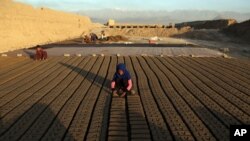The International Convention on the Worst Forms of Child Labor has been universally ratified. The International Labor Organization said this is the first time in its history that all 187 of its member states have ratified an International Labor Convention.
An estimated 152 million children are in child labor. Seventy-three-million are involved in hazardous work that the International Labor Organization defines as the worst forms of child labor.
ILO Director-General Guy Ryder said the universal ratification of the convention means that children now will benefit from critical legal protection against the worst forms of child labor.
“In the past, it has too often been the lot of children to be used to fight in armed conflict, to be sold as slaves, forced into work in the drug trade or in the production of child sexual abuse material or exposed to hazardous substances and long hours," Ryder said. "In every country, now these practices have been condemned, and clear legal prohibitions against them have been established everywhere.”
However, Ryder warns against complacency. He said countries must do more to end impunity for violators and for violations of children’s right to be free from child labor. He said governments must implement and enforce the provisions in the convention.
Since the ILO convention was adopted in 1999, the incidence of child labor and its worst forms dropped nearly 40% by 2016. However, progress has slowed in recent years, particularly among children five to 11 years of age, and in some geographical areas.
Africa is the region with both the highest absolute number of child laborers and the highest prevalence. Ryder tells VOA the situation in Africa is very worrying.
“Just over 72 million African children are in child labor. Of those, 31.5 million in hazardous work," Ryder said. "The prevalence rate then is nearly 20%. Nearly one in five of all African children are in child labor. … Progress seems to have stalled in Africa, and child labor in absolute terms actually increased in sub-Saharan Africa from 2012 to 2016.”
The ILO chief fears years of progress in reducing child labor are at risk of being reversed by COVID-19. He notes the pandemic has caused global unemployment to skyrocket. As more and more people lose their livelihoods and means of survival, he said the danger and temptation to push children back into the labor market will grow.












